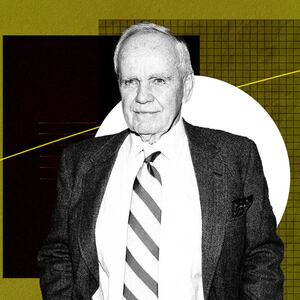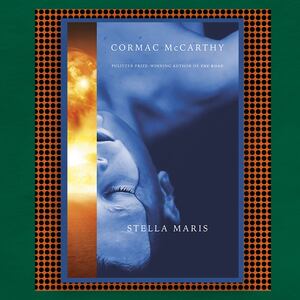News of the death of Cormac McCarthy earlier this week has been met with an expected wildfire of melancholy. McCarthy, at 89, was one of few living authors with a standing claim to the title of the Great American Novelist, both for how widely beloved his writing was and for how frequently he threw a spotlight, at once mythic and unflattering, on the essential character of the Southwest. His sudden absence leaves a crater of Grand Canyon proportions on the literary landscape.
One does have to wonder what McCarthy himself would say of such public lamentations, the very big deal the world is making of his passing. Death, after all, was a defining subject of his work. It cast a terrible shadow over his visions of the barbaric past and future—and over the movies, rarely as good as the books, made from them.
In his work, McCarthy was almost never sentimental about death. He acknowledged it as a constantly looming reality, indiscriminate in aim, often brutal in realization, inescapable. You could say his death on Tuesday fulfilled the promise and invisible dramatic arc of his bibliography: Like Emily Dickinson, another American writer of morbid preoccupations, he seemed to be preparing for it his whole career.
At least once, Hollywood managed to bottle the fatalistic power of McCarthy's work. On screen, as on the page, No Country For Old Men is an impossibly lean, nasty thriller that decays, like a body under the sweltering Texas sun, into a kind of deconstruction of the genre itself. Much of the book’s amenability to adaptation comes from how it was written: McCarthy originally conceived the story as a screenplay, and those origins remain detectable in the brisk, bleak 2005 bestseller he wrote instead, characterized by typically sparse prose but also an uncommonly direct presentation of events. It already reads like a movie, and Joel and Ethan Coen, the great filmmakers tasked with officially making it into one, treat the words like a blueprint. Their No Country is an act of faithful transcription, give or take a few concessions.
Just as crucially, the Coens preserved the ruthlessly, deceptively straightforward narrative of the novel. And that includes the story’s biggest surprise and most subversive twist, so radical you can scarcely believe it made it into a studio picture, let alone one that would go on to win the Academy Award for Best Picture. Of all the deaths in McCarthy's work, is there one more boldly, shockingly unceremonious than—spoiler alert—the ignoble end of cowboy protagonist Llewelyn Moss (Josh Brolin), who’s shot and killed offscreen around the end of the second act?
That choice is straight out of the book, of course. One minute Moss, the gruff, competent, prototypical Marlboro Man we’ve been following for some 230 pages of life-or-death situations, is trading some friendly words with a flirtatious stranger at a motel. The next, he’s dead on a slab—a detail that reveals itself with little passion or emphasis, like it’s no more important than any other.
The Coens, in truth, inject a little more suspense into the moment, or maybe just a different kind: Instead of surveying the crime scene hours later—with McCarthy strategically withholding the information of who’s dead for a few pages—Sheriff Ed Tom Bell (Tommy Lee Jones) shows up right at the tail end of the gun fight, but not soon enough to see our hero breathe his last breath. Moss dies between scenes, after the Coens fade out of a casual poolside chat, and before they cut back into the aftermath of a bloodbath, with Brolin’s outlaw already still.
Not since Norman Bates brought the knife down on a showering Marion Crane has a Hollywood thriller more fiendishly confounded viewer expectations. With Psycho, Hitchcock was pulling his ultimate prank on the audience, prematurely snuffing his protagonist to send a smirking warning: You're not safe, no one is safe, all bets are off.
No Country, which similarly pivots around the MacGuffin of a stolen satchel of money, is nearly as discombobulating. It also yanks the rug with philosophical intent, as a statement of worldview.
That No Country works splendidly as a thriller until it doesn’t is all part of its brilliant design. For a long while, it delivers the conventionally entertaining goods, albeit of a more terrifying variety than usual: There’s a white hat (Moss), a black hat (Javier Bardem's blood-curdling assassin Anton Chigurh, one of cinema’s greatest villains), and a lawman taking the rear (Bell). They chase each other. The movie is such a slender, muscular piece of genre filmmaking that you can’t help but confuse it for an archetypal exercise—just a terrifically skeletal, violent game of cat and mouse, only “about” its expert mechanics. And so when Moss promises to bring the fight to Chigur, it feels like the movie is prepping us for a final gunslinger showdown, a duel for the ages.
That, too, is part of the cruelty of how things play out: Moss’ unseen, unexpected death denies the audience the rousing climax we’ve been taught to expect. It’s not just that the cowboy doesn’t win—that happens sometimes in Westerns. It’s that he loses without fanfare, without a death scene, without a legendary Butch and Sundance freeze frame. Not heroically. Not at the end. To the extent that he goes down shooting, we don’t see it. He dies alone in the dark nothingness between scenes. And it’s not even Chigurh, the big bad, who kills him. It’s an anonymous, nearly unseen group of cartel members.
McCarthy's point is simple but profoundly delivered. He upends the trajectory of his tale—the misleading impression of a mano-a-mano climax shifting into focus—to indict the whole romantic framework of our Western outlaw stories—and to confound our notions of a moral universe. There’s no real lesson to be learned from Llewelyn’s fate: Yes, he takes the money (crime doesn’t pay, or so we’ve been told before), but he also goes back to give a dying man water, putting his hide on the line. And he’s just one of many characters Chigurh kills, without pity or remorse or even reason, over the course of the story.
It’s tempting to see Bardem’s deranged killer as a force of pure evil, but McCarthy denies us even the comfort of that moral reading by making him mortal without knocking him off. Another of No Country’s brilliant subversions teases us with a near irony. After Chigurh escapes the law and clears his execution list, he’s randomly hit by another driver in a residential fender bender. Will this instrument of destruction meet his own maker in an ordinary car accident? No, he survives that, too. There’s no logic to who dies or when. No sense to any of it.
Ultimately, it’s that offscreen death, that diabolical excision of incident, that stings the most and the best. In refusing to depict Moss’ final moments, the Coens, following McCarthy’s lead, capture the cruel, pointless, unavoidable suddenness of death. One minute you’re alive, the next you’re not. It’s a fate impossible to avoid or predict. Or, as someone puts it towards the disquieting ending of No Country For Old Men, “You can't stop what’s coming.”
McCarthy couldn't either, of course. But he found a wicked, unforgettable way to say so before joining all the fictional men and women he sent first into the dark.







